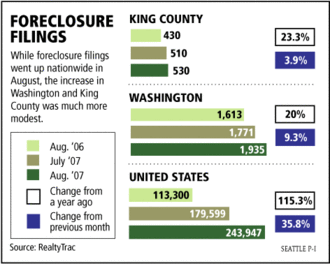I received a fairly lengthy comment from someone (aka Cogger) who did not leave their real name or company…he/she appears to be from a bank but I can only assume. Here are some points from the comment that I would like to address:
"That’s great you passed your mandatory test."
Yes, it is a mandatory test. I’m glad we have it in place so that it will raise the current bar of entry to be a loan originator for a Mortgage Broker in Washington. This is a welcomed improvement to our industry. Is there a mandatory test to prove competence to be a mortgage banker in Washington?
"What continuing mortgage education did you take prior to this requirement."
I earned my CMPS designation last year. Prior to that, I began working on earning my CFP (that’s on the back burner). I belong to Mortgage Market Guide, Loan Tool Box, Strategic Equity and WAMB. I am a self motivated student of mortgage. I continue to attend as many seminars and to self study as much as possible in addition to training that I have received at my company where I have been employed for over seven years. Prior to being in mortgage, I was in the title and escrow industry for 14 years where I managed a escrow branch…I learned plenty about the mortgage industy sitting across from signing tables from consumers.
"If you have ever had the luxury of working for a bank you would know that compliance, ethics, security, etc… modules are required annually by the bank employees. We don’t wear these requirements as badges, rather we separate ourselves from the rest by demonstrating our knowledge. In addition, most of these employees continue to expand their knowledge with such certifications as CMPS. This is done for the sake of education rather than requirement. Of course, there are always employees that engage in education more so than others, but to try to distinguish yourself from the rest of the pack without truly knowing the facts tells me what you really know about the banking industry. I get your point….but really, can you actually believe that there are not well qualified employees with these institutions?"
I have only worked for one mortgage company which is a correspondent lender. We are a HUD approved lender. We can provide FHA and VA mortgage loans in addition to all the other programs of lenders we have a correspondent relationship with. Do we have compliance regulations? You better believe it.
I have never worked for a bank. This is why I’ve asked in this post and others for mortgage bankers to respond with what their specific requirements are so I can compare them to those of a mortgage broker LO. I have yet to have someone reply with detailed information. I am proud and will wear being licensed as a badge. Many LOs will not pass the exam, I studied and apply myself to my industry. I’m committed to my clients. There’s nothing wrong with taking pride in what I do for a living. You are correct, I don’t know a lot about the banking industry and I (again) welcome a response on what mortgage bankers have to do to comply with state and federal regulations to be loan originators. There is nothing stopping a LO who works for a bank mortgage company from taking the same exam and the same continuing education courses that a LO who works for a mortgage broker is required to.
There are "bad actors" at the mortgage banks too. You can’t really believe that just because someone works for a bank that they are above bad mortgage practices? Just last week I received an email from a borrower who just closed a loan from a major bank-mortgage lender. They had escrow change the final HUD-1 after closing increasing the closing costs by $2600 without telling the client. They only found out when their proceeds was shorted. I may be telling their story in a future post…I’m waiting for the clients permission.
"You have not addressed the Banker/Broker scenario. So what’s your take on a Banker/Broker? You must realize that working with just a broker has far more limitations for the client vs. working for a Banker/Broker."
I’m assuming this is referring to a Correspondent Lender? I’m really not sure. Cogger, if you’re reading this post, please let me know and I’ll respond. I am a Correspondent Lender which, in my book, is the best of both worlds. We work from our own credit line and broker loans. It is similar to being a banker and a broker. What if you work for a bank who’s products are pulling away and you cannot broker to another lender? A broker or correspondent lender has the ability to quickly move to another lender if needed.
"We all know that there are bad LO’s just as there are bad attorneys, cops, doctors, CPA’s, etc…Reading through your website I see a lot of attacks towards the bad one’s in the industry….However, in my opinion to continue to harp on the bad to prove a point that you work differently is a balancing act that is razor sharp. To continue to point out the flaws in the industry you feed into the stereotype of mortgage brokers. Try illustrating your skills without the examples of what others have done wrong. People can figure that out for themselves that you are good at what you do without perpetuating our industries stereotypes."
I believe this is referring to my posts on the subprime lender. This was not about saying "I’m better than him". This LO contacted me looking for help on how to become a better LO and how to develop a relationship based business. I’m flattered he would contact me and I was sickened by his story. Not by him. Someone younger (I don’t know his age) and impressionable could easily fall into his trap with his employer and "drink the kool aid". The purpose of those post were two fold:
-
To tell a different side of the subprime/predatory lender story. This LO was fed a bunch of bull and he believed it. Now he’s dealing with guilt and trying to clean up his life.
-
To warn consumers that there are LOs out there who are great at selling but do not know what they’re doing to you financially and may not care.
Posting his story had nothing to do about elevating my status as a mortgage professional.
It’s just recently that I’ve covered "the bad ones" in this industry. The other post I did about LOs who irk me is about two of my past clients who have been damaged by other LOs. I will not apologize for exposing what others have done and I only hope it will help other consumers. I have been receiving a deluge of emails from consumers who are in trouble from the loans they received from their mortgage broker OR their mortgage banker. I have not posted all of them. They have stories they want to tell.
"A more cohesive industry is a healthier one for all of us."
Amen. How about we all abide by the same laws and guidelines? It would not only benefit the mortgage industry as a whole (bankers and brokers) but most importantly, it would benefit consumers as well. Isn’t that what it’s all about? Where do consumers go if they have a legitimate complaint about their LO? They have to determine if they’re a mortgage broker, banker and then who regulates them…it’s a mess.
I agree with you. A cohesive mortgage industry would benefit all. We don’t have that right now.









Recent Comments